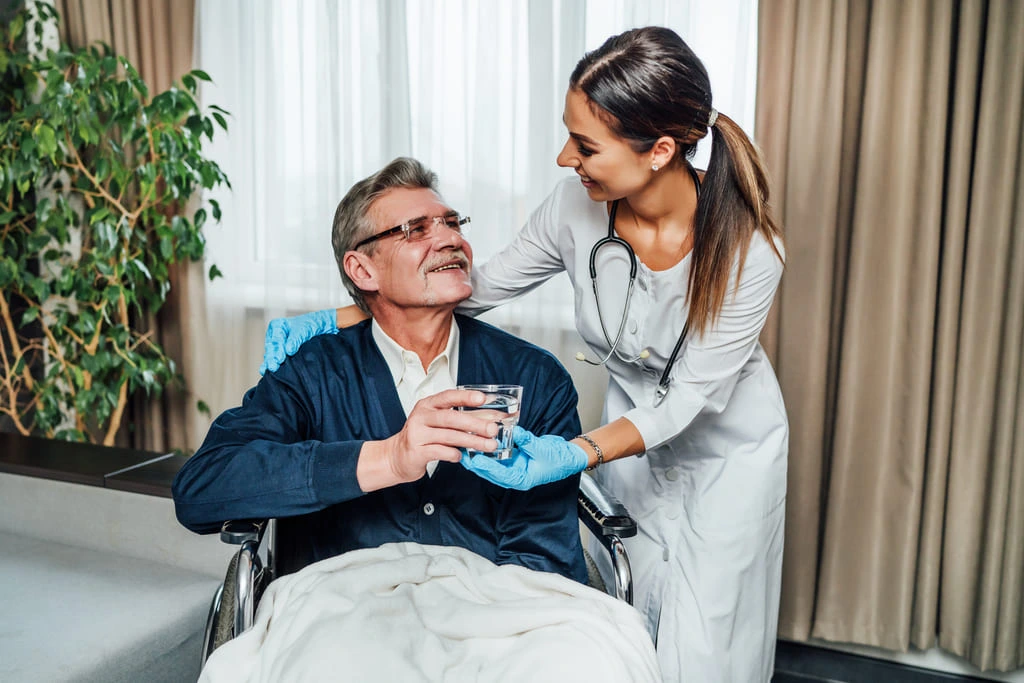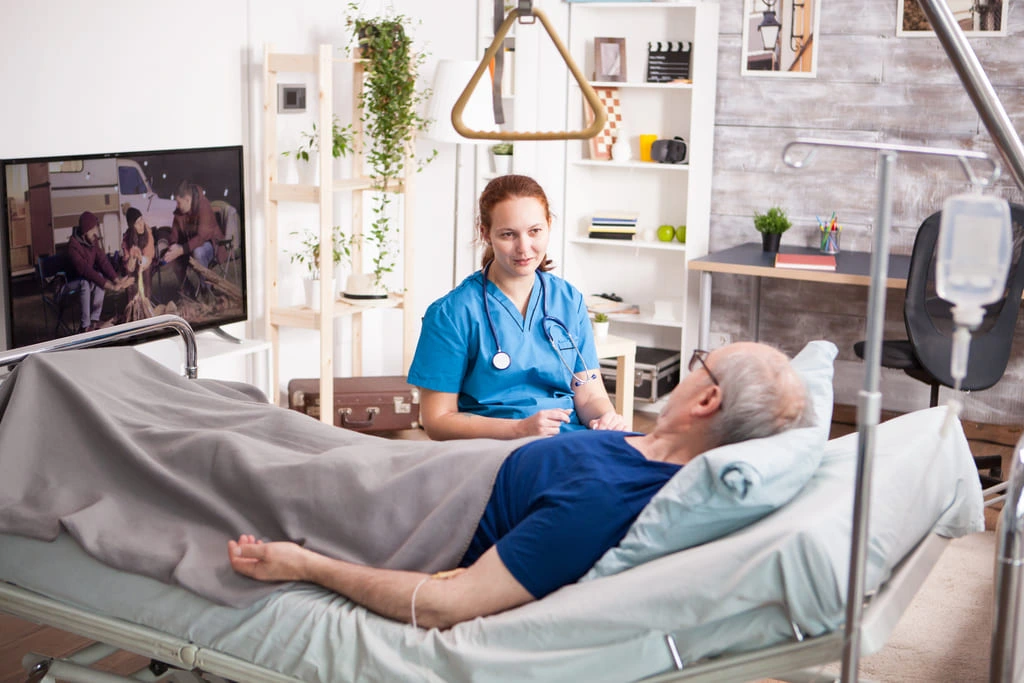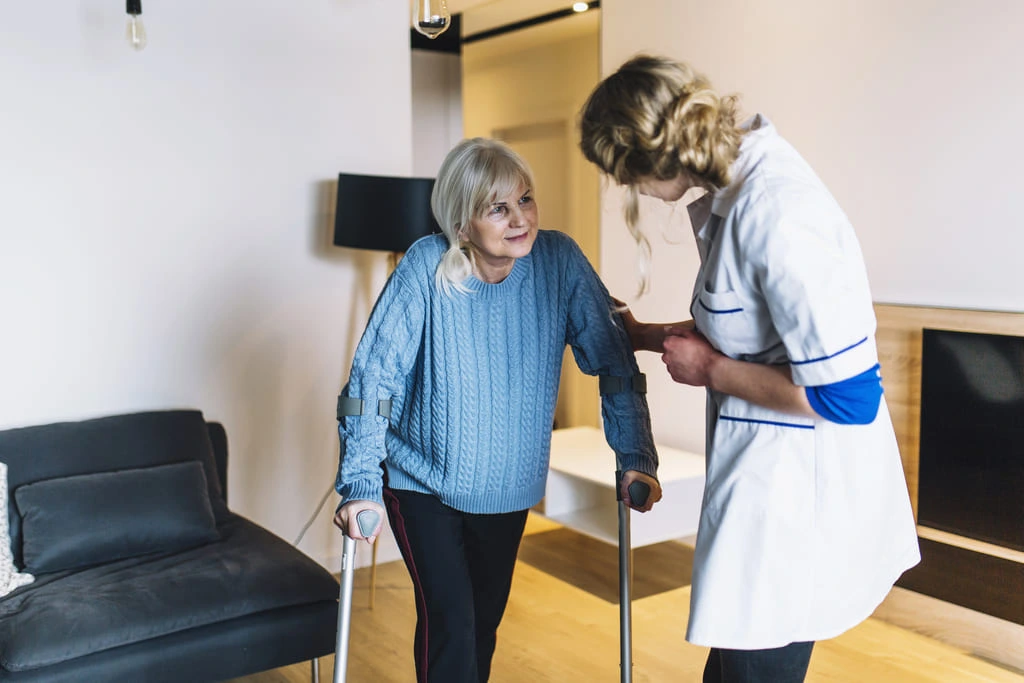What Is Nurse-Led Care?
Nurse-led care is a healthcare model where nursing professionals take on an active and central role in providing comprehensive and person-centred services in complex care. This approach emphasises that registered and specialist nurses are integral in delivering high-quality and personalised nursing care across various settings, particularly primary care. Unique Community Services’ nurse-led services are designed to meet the diverse needs of individuals, promoting positive health outcomes and improved well-being for the people we serve. By harnessing the expertise and skills of the nursing workforce, this model optimises the utilisation of healthcare resources while ensuring a holistic and person-centred approach to care.
In this model, nurses take on expanded responsibilities beyond standard caregiving, becoming leaders and decision-makers within multidisciplinary care teams. Nurses collaborate closely with other healthcare professionals in nurse-led care, ensuring a well-coordinated and integrated approach to management in primary care. These nursing professionals are involved in direct care for the people they support and contribute significantly to their education, disease prevention, and health promotion initiatives. Their unique perspective, grounded in clinical expertise and advocacy for the individuals they serve, helps foster a person-centric environment that emphasises individual needs, preferences, and cultural considerations.
Nurse-Led Care at Home
By delivering specialised care directly in the comfort of people’s own homes, nurses can offer personalised nursing care and support tailored to the unique needs of each individual. This approach fosters a stronger relationship between the registered nurse and the individual receiving care, enhancing communication and trust and improving health outcomes. In a home environment, individuals often feel more at ease and less stressed, leading to improved emotional well-being and increased compliance with treatment plans.

In care at home, nurse practitioners take the lead in providing a wide range of services in nursing care, from routine health monitoring to more specialised delegated healthcare tasks. As registered nurses with advanced training and expertise, they are ideally tailored to lead such services, ensuring that individuals receive high-quality care provision in the familiarity and comfort of their own homes. Offering a nurse-led service in a home setting is cost-effective and reduces the impact on healthcare facilities, and minimises unnecessary hospital admissions. This approach is particularly beneficial for individuals requiring respite care, end-of-life care, and palliative care, where personalised care and compassion play a vital role.
The nurse-led care coordination ensures seamless communication among healthcare professionals, ensuring that individuals receive holistic and comprehensive support tailored to their unique needs, all while fostering a sense of security and dignity in their own homes. Additionally, nurse-led care at home allows for greater family involvement, enabling loved ones to actively participate in the person’s recovery and care process, gaining greater independence and involvement in the local community.
Nurse-Led Care Services
Nurse-led care services have emerged as a vital approach to healthcare delivery, placing nurses at the forefront of care management and treatment. Nurse-led care services are integral to revolutionising healthcare delivery through innovative nurse-led interventions and specialised nursing practices. In diverse healthcare settings, such as emergency departments and specialist care units, nurse-led intervention has proven highly effective in managing complex care plans, including acute and chronic conditions.
Registered nurses provide individuals with various essential services that promote and support people’s recovery and independence, helping them to live fulfilled lives. Some of the services nursing care offers include:
- Person-centred and evidence-based therapeutic interventions
- Conducting assessments: Registered nurses perform comprehensive health assessments to gather crucial information about an individual’s medical history, condition, and vital signs
- Administering medications: RMNs are responsible for administering medications and intravenous therapies as physicians or advanced practice nurses prescribe
- Wound care management: They assess, clean, dress, and monitor wounds to promote healing and prevent infections
- Monitoring the individuals’ conditions: RMNs closely monitor the health status, including vital signs and symptoms, and promptly report any significant changes to the healthcare team
- Creating and implementing care plans: Registered nurses develop individualised care plans for the individuals they serve, considering their health needs and goals
- Supporting peoples’ emotional needs: RMNs offer emotional support and care to individuals and their families during challenging times
- Infection control: They adhere to strict infection control protocols to minimise the spread of infections within healthcare settings
- Emergency response: RNs are often part of the team responding to emergencies, providing critical care and support during urgent situations
These advanced nursing approaches encompass various specialities, from diabetes care to palliative care and different models of service delivery, ensuring individuals receive comprehensive and personalised care and support. Nurse-led care teams are known for their collaborative and person-centred approach, emphasising holistic care planning that addresses not only the physical aspects of the condition but also the emotional and social well-being. This person-centric approach improves outcomes, making nurse-led care services vital to healthcare systems.
Roles and Responsibilities of Nurses in Leading Care Initiatives
One of the key responsibilities of nurses in leading care initiatives is to develop and implement best practices that enhance positive outcomes, safety, and satisfaction. Moreover, nurses are responsible for the overall management, coordination, continuity of care, staying up-to-date with the latest medical advancements and research, and continuously refining their skills and knowledge to provide the best care possible.

The roles and responsibilities of nurses in nursing practice initiatives encompass many ways of supporting service delivery, including:
- Coordinating care and managing resources efficiently to ensure seamless transitions between different healthcare settings
- Creating safe places of positive care settings
- Offering expert professional help to individuals in mental distress and additional support to their families
- Building effective relationships with individuals, their relatives and carers, and work across the physical, mental and social aspects of care
- Training about the legal context of their work and how to identify whether someone may be at risk of harming themselves or others
- Working as part of an MDT care team, which can include GPs, psychologists, social workers, psychiatrists, AHPs and support workers
- Prescribing medication within the scope of practice
Benefits and Advantages of Nurse-Led Care
The benefits of providing nurse-led care in the individual’s own home extend beyond the individual level, with positive impacts on the healthcare system as a whole. Care at home reduces the strain on hospital resources, decreases the likelihood of hospital-acquired infections, and minimises the risk of hospital readmissions. Moreover, it helps optimise healthcare costs by focusing on preventive measures and early intervention, ultimately leading to better allocation of healthcare resources. The overall impact of nurse-led care at home is more person-centred, with a holistic approach and efficient nursing expertise, transforming health and social care and prioritising the well-being of the people they support while promoting long-term sustainability for the healthcare industry.
Impact of Nurse-Led Care on the Healthcare System
Nurses’ involvement in people management has led to streamlined processes, reduced wait times, and increased satisfaction of care users. Their holistic approach to care ensures that a person’s physical, emotional, and psychological needs are met, promoting faster recovery and better overall well-being. Establishing a caring connection between a nurse and the individual they support is essential to building trust and fostering a therapeutic relationship. Individuals who know that someone cares about them are more likely to feel satisfaction regarding their care and experience better health outcomes.
This shift in healthcare dynamics has fostered a collaborative and efficient system where nurses work alongside other healthcare professionals, fostering a strong sense of teamwork and creating a conducive environment for innovation and continuous improvement. As nurse-led care continues to flourish, the healthcare system is witnessing a positive transformation, setting new standards for person-centred care and making a positive change towards a better future for all.
Empowering People through Nurse-Led Care
The transformative process that puts individuals at the heart of their own journey to well-being is deeply rooted in the principles of person-centred care and a humanised approach. Nurses strive to understand each individual’s unique needs, values, and preferences. They go beyond just treating symptoms, taking the time to listen actively and compassionately. This approach fosters a deep sense of trust and respect, enabling people to participate in decisions about their health and treatment plans actively. As a result, individuals feel valued, heard, and empowered to take ownership of their well-being, enhancing their overall healthcare experience.

Nurse-led care with a person-centred and humanised approach is a powerful catalyst for positive change in healthcare. It recognises the importance of not just the physical aspects of health but also the individuals’ emotional and psychological well-being. This approach fosters open communication and collaborative decision-making.
Expert Nurse-Led Care at Home with Unique Community Services
At Unique Community Service, we believe that every individual deserves the highest provision of care and respect tailored to their unique needs and preferences. Our approach is rooted in human rights principles, ensuring that each person’s dignity and independence are maintained throughout their healthcare journey. We understand that health challenges can be overwhelming, which is why our compassionate team of expert nurses and nurse-led clinicians goes above and beyond to provide medical expertise and emotional support, creating a warm and nurturing environment for the people we serve.
What sets us apart is our strong emphasis on providing humanised services in the person’s own home, recognising that a person’s health is impacted by their social and environmental context. By incorporating this holistic approach, we empower individuals to participate in decisions about their care actively.
At Unique Community Services, we are committed to advocating for the human rights of each person we serve, fostering an inclusive and compassionate healthcare experience that makes a real difference in their lives.
Contact us today; our offices are located in Manchester and Leeds, and we deliver services across the UK.

